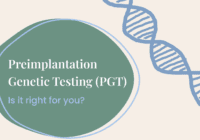October is Pregnancy and Infant Loss Awareness Month. Honouring a subject close to many hearts, we’re offering a guide to navigate tests/treatments after recurrent miscarriage.
If you have experienced one or multiple miscarriages and are unsure of what next steps to take to build your family, let this be your roadmap.
Unquestionably, miscarriage is one of the most challenging potential outcomes of pregnancy. It can be both heartbreaking and terribly discouraging for future parents.
While this may be true, one piece of solace we can offer you is that you are not alone. Generally, 15-20% of pregnancies end in miscarriage. What’s more, around 60% of cases, miscarriage is a random occurrence where an embryo is given an abnormal number of chromosomes in the fertilization process. There is no medical condition behind this, although it does become more common with age.
Fortunately, miscarrying once does not mean you are at a higher risk of miscarriage in future pregnancies.
Around 2% of women will have two consecutive miscarriages, while 0.5% a third consecutive miscarriage. In this situation, this could signal a reproductive problem. We call it “recurrent pregnancy loss” after two or more failed pregnancies.
If you’ve had 2-3 miscarriages, tests are generally recommended to identify problems that could be preventing you from sustaining pregnancy. The right assessment should screen for genetic factors and antiphospholipid syndrome. As well, they should further examine the uterine anatomy, hormonal and metabolic variables, in addition to lifestyle factors.
Below is a list of some tests that your doctor might suggest.
Testing options after recurrent miscarriage
Chromosomes (Karyotype) – tests both partners for a structural rearrangement of the chromosomes, which can result in a higher chance of miscarriage. The incidence of this is about 4% in the population of patients with recurrent miscarriage.
TSH (thyroid stimulating hormone) – measures thyroid hormone levels. High or low levels can cause miscarriage.
Thyroid antibodies – can identify an underlying thyroid condition which is not detected in the TSH. Thyroid antibodies can make conception challenging and cause miscarriage.
Prolactin – measures the pituitary hormone level. If elevated, this can lead to miscarriage.
Sonohysterogram – assesses the uterine cavity for congenital structural abnormalities, uterine polyps or fibroids within the uterine cavity. These can lead to a greater risk of miscarriage.
Endometrial biopsy – obtains a sample of tissue from the uterine lining. This can be tested for adequate luteal phase progesterone production, chronic inflammation, infection, or a normal uterine microbiome.
ANA (antinuclear antibody) – screens for evidence of autoimmunity, which may cause problems with implantation.
APA (anti-phospholipid antibody) – also called anti-cardiolipin antibody. If you test positive, you may have problems with blood clotting and blood flow to the placenta and baby.
Once you’ve undergone the appropriate tests, your doctor will have a better picture of what’s preventing your body from sustaining pregnancy. Depending on your situation, your doctor may recommend some or all of the below treatments.
Treatments for recurrent miscarriage
Baby aspirin and Heparin – if you have a positive APA, these can prevent blood clots and improve blood flow to the baby.
Prednisone – this steroid medication can lower the risk of a mother’s cells attacking a developing embryo.
Progesterone – after ovulation, this can help the uterine lining sustain pregnancy.
IVIG (intravenous immune globulin) – if a woman has elevated natural killer cells, this is a transfusion of antibodies that can lower the risk of the body rejecting pregnancy.
Moving forward after miscarriage
Whether you have had one or multiple miscarriages, we hope this blog post leaves you feeling more empowered to talk to your doctor about your options for testing and treatment.
Miscarriage does not have to be a confusing nor a discouraging experience that you go through alone. We encourage you to lean on loved ones, support groups, and your medical team in order to heal from the experience and go on to build the family that you want. Furthermore, for resources to help you deal with the grief of miscarriage, you can read our past blog post on The Taboo of Miscarriage and why we should talk about it.
Dr. Tanya Williams Fertility Centre is happy to help you find the right tests and treatment options, in addition to offering any needed support your fertility journey.
Print source:
Dehn, B. (2004). Your Personal Guide to Infertility. Blue Orchid Press.






